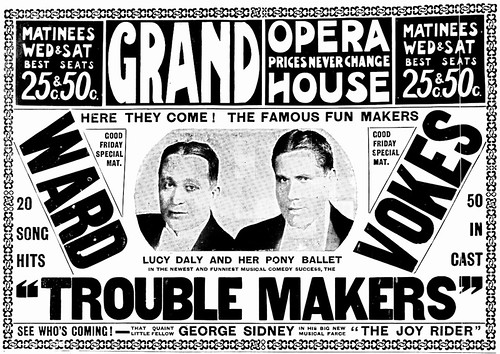making trouble at the grand opera house with ward and vokes
 |
| Source: the Toronto World, April 9, 1911. Click on image for larger version. |
Second thing about this ad which caught my eye: "Lucy Daly and her Pony Ballet." Did Ms. Daly bring ponies on stage to performance classical ballet? Did she do an interpretative dance routine to salute ponies? While I'm unable to confirm either theory, it appears Daly was a singer/dancer who had toured with headiners Hap Ward and Harry Vokes for several years. The New York Dramatic Mirror noted that during a production of A Pair of Pinks in Montreal in 1905, Daly "was as bright and vivacious as ever and danced beautifully." I also wonder if she was related to another frequent performer in Ward and Vokes productions, Vokes's wife Margaret Daly-Vokes.
Third thing about this ad which caught my eye: "The Famous Fun Makers." Ward and Vokes were unknown to me, which prompted some digging. They appear to have been a popular touring act across North America starting in the late 1880s, producing farcical musicals. A program for their production of A Run on the Bank at London, Ontario's Grand Opera House in 1896 lists witty character names like Con Mann, Clubs R, Trumps, Adam Shame, Nera Mann, Billy Booze, and Sassy Moll ("a tough girl").
Harry Vokes's New York Times obituary raises another question about this ad: did Toronto audiences actually see Hap Ward, or did another comedian assume the name? According to Vokes's obit, the pair split in 1904 when War retired. Yet the act continued for several years. It's entirely possible Vokes kept the act's name, using new partners as necessary, or maybe the Times meant 1914. Vokes continued to perform until 1918, after which he worked at the Beacon Oil Company plant in Everett, Massachusetts. He died from injuries sustained in a plant explosion in 1922 at the age of 55. It was noted that "Hap Ward was at his old partner's bedside during the night." Ward spent his retirement running a roadhouse near Boston, then died in New York City in 1944. His obit notes that he left behind a widow named Lucy - Lucy Daly of pony ballet fame, perhaps?
 |
| Source: the Toronto World, April 9, 1911. |
Local reviews of Trouble Makers were positive, albeit in the way most productions of the period received thumbs up (Toronto's newspapers lacked quality drama critics until the arrival of Herbert Whittaker and Nathan Cohen after World War II). E.R. Pankhurst of the Globe noted:
The piece is replete with ludicrous situations, the comedy perfectly irresistible. The dances and ensembles have much to commend them; the scenic settings are excellent, which the musical numbers...are particularly pleasing. Altogether the production offers diverson that could not be bettered and Ward and Vokes incidentally score another triumph.
Additional material from the April 11, 1911 edition of the Globe, the June 3, 1905 edition of the New York Dramatic Mirror, and the April 16, 1922 and January 4, 1944 editions of the New York Times.

Comments
Mark Laughlin, distant cousin of Harry Laughlin/Vokes.